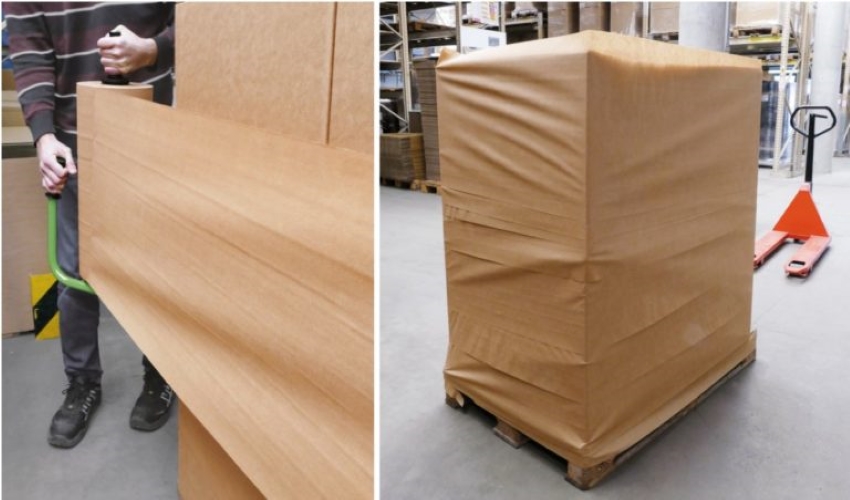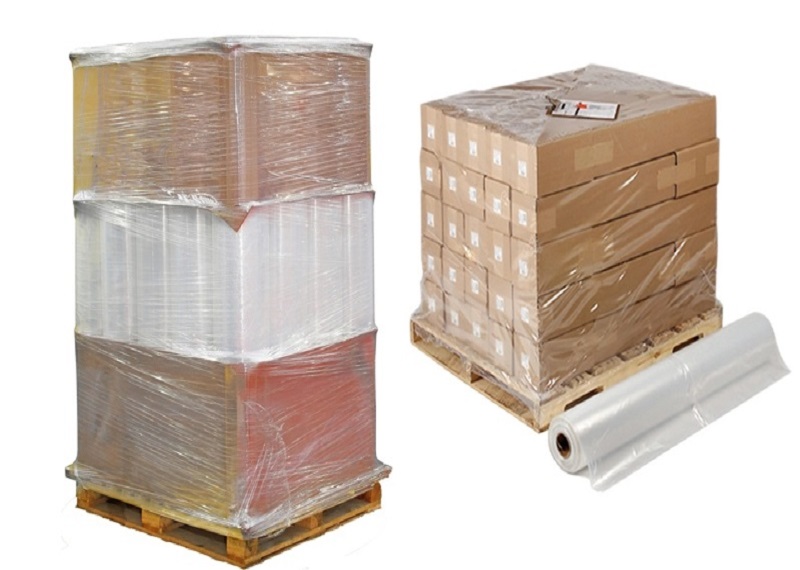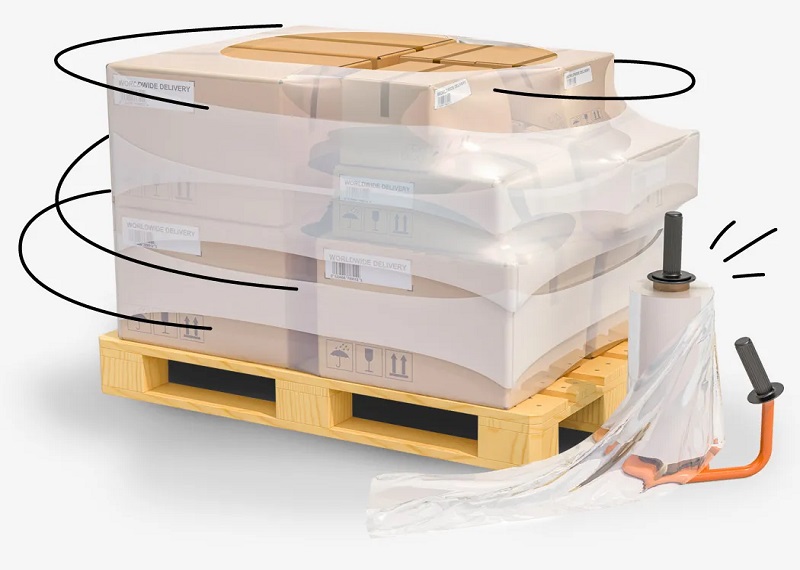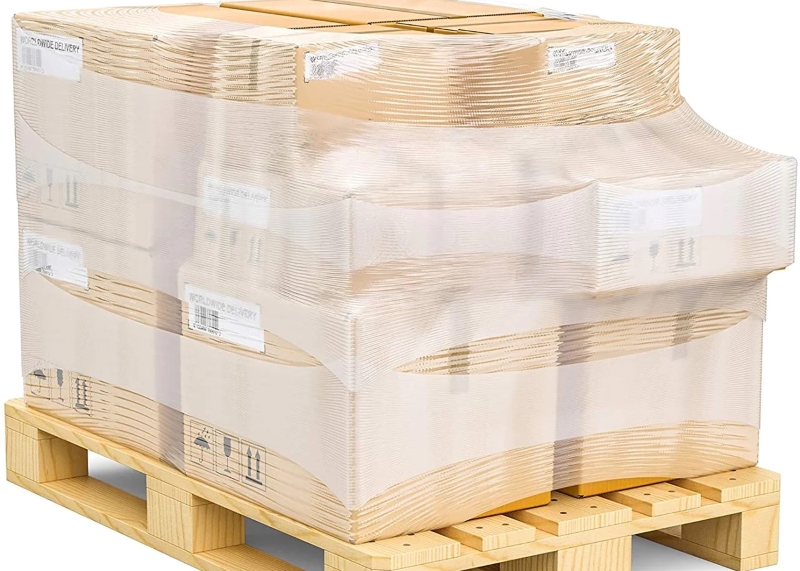
Industrial pallet wrap, a type of plastic film used to secure and stabilize palletized loads, plays a crucial role in modern packaging solutions. This material is essential for protecting goods during storage and transportation, minimizing the risk of damage from external factors such as moisture and dirt. In the logistics and shipping industries, industrial pallet wrap ensures that products remain intact throughout the supply chain, enhancing efficiency and reliability. By effectively bundling items together, it not only simplifies handling but also maximizes space utilization in trucks and warehouses. As businesses increasingly prioritize sustainability and cost-effectiveness, the importance of industrial pallet wrap in optimizing operations and safeguarding products has never been more evident. Industrial pallet wrap is a durable, elastic film used to secure goods on pallets, ideal for industrial, marine, and home applications.
Industrial pallet wrap is a highly durable and flexible plastic film used primarily for securing goods on pallets during storage and transportation. This wrapping material plays a vital role in the logistics and shipping industries by providing an effective solution for protecting products from damage while ensuring stability during handling. Understanding the components and characteristics of industrial pallet wrap is essential for businesses looking to optimize their packaging processes.

The primary materials used to manufacture industrial pallet wrap are polyethylene and polypropylene.
Both materials can be produced with different additives to enhance specific properties, such as UV resistance or anti-static capabilities. These enhancements can further improve the performance of industrial pallet wrap in various applications.
One of the critical characteristics of industrial pallet wrap is its strength. The film is engineered to withstand significant tension during the wrapping process, ensuring that it clings tightly to the products without tearing. This strength is essential for maintaining load stability, especially during transportation, where loads can shift and move.
In addition to strength, elasticity is another crucial feature of industrial pallet wrap. The ability to stretch and conform to the shape of the wrapped items allows for a snug fit, reducing the risk of products shifting or falling during transit. The stretchability also enables the wrap to absorb shocks and impacts, further protecting the goods inside.
Industrial strength pallet wrap refers to a more robust variant of standard pallet wrap, specifically designed to handle heavier loads and provide superior protection. This type of pallet wrap is often thicker and engineered to withstand harsher conditions, making it suitable for industries such as manufacturing, construction, and distribution, where durability is paramount.
Industrial strength pallet wrap offers several benefits, including enhanced tear resistance and the ability to maintain its integrity under extreme conditions. This makes it particularly useful for securing large or heavy items that require additional support. Businesses that deal with heavy machinery, metal parts, or bulk materials often rely on industrial strength pallet wrap to ensure that their products remain secure during transport.
This type of wrap typically features high stretch ratios, allowing for effective load containment without compromising the wrap’s strength. The enhanced performance characteristics of industrial strength pallet wrap make it an invaluable asset for companies looking to improve their packaging solutions.
Industrial pallet wrap is a critical packaging material used in various industries to secure products during storage and transportation. Made from materials like polyethylene and polypropylene, it offers excellent strength and elasticity characteristics that ensure the safety and stability of wrapped goods. Understanding the specifics of industrial strength pallet wrap further highlights the importance of selecting the right type of wrap based on the needs of the business. By leveraging the appropriate materials and strengths, companies can optimize their packaging processes and enhance product protection.
Industrial pallet wrap comes in various types, each designed to meet specific needs in packaging and securing products. Understanding the different types can help businesses select the most appropriate solution for their applications.
Hand pallet wrap is a versatile and user-friendly option that allows operators to manually wrap products on pallets. This type of wrap is typically available in smaller rolls that can be easily handled without the need for machinery.
Hand pallet wrap is often made from polyethylene and is characterized by its stretchability and clarity. It is commonly used in smaller operations or for packaging items that vary in size and shape. This type of wrap is ideal for securing lighter loads and providing a tight seal around products to prevent movement during transit.
Applications for hand pallet wrap include:
Hand pallet wrap is cost-effective and provides flexibility, making it a popular choice for businesses with varying packaging needs.
Machine pallet wrap is designed to be used with automated wrapping equipment, making it suitable for high-volume operations where efficiency is crucial.
Utilizing powered equipment to apply industrial pallet wrap offers numerous advantages:
Machine pallet wrap is generally thicker and stronger than hand wrap, making it suitable for heavier loads and enhancing load stability during transport. It’s commonly used in distribution centers, manufacturing facilities, and industries that require efficient packaging solutions.
Industrial strength pallet wrap is a highly durable, resilient option designed for securing heavy and oversized loads that require extra support. This type of industrial wrap is manufactured with thicker, higher-quality materials to withstand high tension and prevent tearing or puncturing.
Industrial strength pallet wrap is essential in industries that handle oversized or unusually shaped products, such as manufacturing and logistics, where extra durability and reliability are crucial.
Pre-stretched film is a specialized type of industrial pallet wrap that is stretched before application, enhancing efficiency and performance.
Pre-stretched film is particularly beneficial for high-volume applications where efficiency and cost-effectiveness are essential. It is commonly used in warehouses, distribution centers, and any setting that requires quick and reliable packaging solutions.
By including “industrial strength pallet wrap” in a dedicated section, the content now highlights its unique applications and advantages within the context of different types of industrial pallet wrap. Let me know if you’d like further adjustments!te industrial packaging pallet wrap, companies can enhance their packaging processes and ensure the safe transport of their products.
Using industrial pallet wrap offers numerous advantages for businesses involved in packaging and shipping. This versatile pallet wrap material provides a reliable solution for securing products during transit, and understanding its benefits can help companies optimize their operations.
One of the primary benefits of industrial pallet wrap is its ability to provide robust protection for goods. The film acts as a barrier against dust, moisture, and various environmental factors that could potentially damage products during transportation. This is especially important for items that are sensitive to moisture, such as electronics, food products, or paper goods.
By securely wrapping pallets, businesses can significantly reduce the risk of damage from external elements. The elasticity of industrial pallet stretch film allows it to conform closely to the shape of the wrapped items, minimizing movement and providing additional cushioning. This protective feature ensures that goods arrive at their destination in optimal condition, which is crucial for maintaining customer satisfaction and reducing costs associated with damaged products.
Another significant benefit of using industrial pallet wrap is its cost-effectiveness, particularly when purchased in bulk. Many suppliers offer discounts for larger orders of wholesale shrink wrap stretch, which can result in substantial savings for businesses with high-volume packaging needs.
Additionally, the efficiency of using industrial pallet wrap can lead to reduced labor costs. With the right equipment, wrapping pallets can be completed more quickly than manual methods, freeing up employees for other tasks. This streamlined process not only saves time but also enhances overall productivity, contributing to cost savings in labor expenses.
As environmental concerns continue to grow, many businesses are seeking sustainable packaging solutions. Industrial pallet wrap can contribute to these efforts, as many options are made from recyclable materials. This allows companies to reduce their environmental footprint by choosing packaging that can be recycled after use.
Moreover, the lightweight nature of industrial pallet stretch film means that it requires less energy for transportation compared to heavier packaging materials. This can lead to lower emissions and reduced shipping costs, further enhancing the sustainability of using pallet wrap.
By incorporating recyclable industrial pallet wrap into their packaging processes, businesses can demonstrate their commitment to sustainability and appeal to environmentally conscious consumers.
Industrial pallet wrap significantly enhances load stability and security during transport. When pallets are wrapped tightly, it prevents individual items from shifting, which is particularly important for tall or stacked loads.
The strong grip of industrial pallet wrap ensures that the products remain intact and stable throughout their journey. This is crucial for preventing accidents during handling and transportation, thereby protecting both workers and goods. Enhanced stability also reduces the likelihood of product damage, leading to lower insurance claims and reduced liability for businesses.
Finally, industrial pallet wrap is highly versatile and can be used for a wide range of applications. Whether for securing boxes, bundling irregularly shaped items, or stabilizing heavy machinery, industrial pallet wrap can adapt to various packaging needs.
This versatility allows businesses to utilize a single solution for multiple packaging scenarios, simplifying inventory management and reducing the need for various types of packaging materials. Companies can choose from different types of industrial pallet wrap—such as hand, machine, or pre-stretched film—to best suit their specific operations, further enhancing efficiency.
Finding the right industrial pallet wrap is essential for ensuring the efficiency and safety of your packaging processes. There are several avenues through which businesses can source high-quality industrial pallet wrap to meet their specific needs.

When searching for industrial pallet wrap, starting with local suppliers and distributors can be highly beneficial. Here are some tips to effectively locate these resources:
In addition to local sources, there are several leading suppliers known for their extensive offerings of industrial pallet wrap. Understanding the options available can help businesses make informed purchasing decisions. Here’s an overview of some notable suppliers:
Finding the right industrial pallet wrap involves exploring both local suppliers and reputable online distributors. By utilizing online searches, local directories, networking, and recommendations, businesses can identify reliable sources for their packaging needs. Additionally, understanding the offerings from leading suppliers like us can help ensure that you find high-quality industrial pallet wrap tailored to your specific requirements. With the right materials in hand, businesses can enhance their packaging processes and improve overall efficiency.
When evaluating the cost of industrial pallet wrap, several factors come into play that can significantly influence pricing. Understanding these factors and comparing prices among different types and suppliers is crucial for making informed purchasing decisions.
| Type of Pallet Wrap | Price Range | Key Features |
|---|---|---|
| Hand Pallet Wrap | $20 - $60 per roll | More affordable; suitable for lower-volume operations; price varies by thickness and quality. Smaller rolls are generally less expensive. |
| Machine Pallet Wrap | $40 - $120 per roll | Priced higher due to engineering for automated systems; offers durability and efficiency for high-volume operations. |
| Pre-Stretched Film | $50 - $150 per roll | Higher upfront cost, but reduces material usage and labor; cost justified by savings in operational efficiency. |
This type of wrap is specifically designed for securing products tightly and providing a protective seal. Pricing for industrial shrink wrap pallet solutions can vary widely, typically falling between $30 and $100 per roll, based on thickness, size, and manufacturer. The cost-effectiveness of using shrink wrap also stems from its ability to stabilize loads and reduce damage, which can save costs in the long run.
Understanding the cost considerations for industrial pallet wrap is vital for businesses looking to optimize their packaging processes. Factors such as material quality, thickness, type of wrap, purchase volume, and supplier pricing all play a significant role in determining costs. By comparing pricing for different types and suppliers, including industrial shrink wrap pallet options, businesses can make informed decisions that align with their budgetary constraints while ensuring the safety and efficiency of their packaging operations.
In addition to industrial pallet wrap, several complementary packaging materials play a vital role in ensuring the safe and efficient transport of goods. These materials not only enhance the protective qualities of pallet wrapping but also cater to various packaging needs across different industries.
Uses in Shipping Small Items
Mailing tubes are cylindrical containers typically made from cardboard or plastic, designed specifically for shipping small, long, or rolled items. They are particularly useful for transporting documents, blueprints, posters, and artwork without creasing or damage.
When combined with industrial pallet wrap, mailing tubes provide an extra layer of protection. For example, multiple mailing tubes can be bundled together and securely wrapped in industrial pallet wrap to create a stable and organized shipment. This method minimizes the risk of items shifting during transport, ensuring they arrive in pristine condition. Additionally, mailing tubes are lightweight and cost-effective, making them an economical choice for businesses that frequently ship small items.
Importance for Relocation and Storage
Moving boxes, also known as corrugated boxes, are essential for both relocation and storage. They come in various sizes and strengths, allowing businesses and individuals to choose the right box for their specific needs. When packing for a move or storing items, using high-quality moving boxes is crucial to prevent damage.
Industrial pallet wrap can be used alongside moving boxes to secure them tightly on pallets for transportation. This added layer of protection helps keep boxes stable, preventing them from toppling over or becoming damaged in transit. Moreover, the ability to wrap multiple boxes together with industrial pallet wrap creates a more efficient loading and unloading process, making it easier for workers to handle large shipments.
Additional Protective Options for Fragile Items
Bubble wrap is a widely recognized protective packaging material featuring air-filled bubbles that provide cushioning and shock absorption. It is particularly effective for protecting fragile items such as glassware, electronics, and delicate equipment during shipping.
When combined with industrial pallet wrap, bubble wrap enhances overall protection. For example, fragile items can be individually wrapped in bubble wrap before being placed in boxes. Once the boxes are secured, wrapping the entire load in industrial pallet wrap ensures that everything remains stable and protected during transport. This method significantly reduces the risk of damage and breakage, providing peace of mind for businesses shipping valuable or delicate goods.
Complementary packaging materials such as mailing tubes, moving boxes, and bubble wrap play essential roles in the overall packaging process. When used in conjunction with industrial pallet wrap, these materials enhance protection, stability, and efficiency during shipping and storage. By integrating various packaging solutions, businesses can ensure their products are well-protected and organized, leading to improved customer satisfaction and reduced costs associated with damage during transit.
While industrial pallet wrap, industrial stretch wrap, and industrial shrink wrap are often used interchangeably, they differ significantly in application, properties, and methods of use. Below is a detailed comparison:
| Feature | Industrial Pallet Wrap | Industrial Stretch Wrap | Industrial Shrink Wrap |
|---|---|---|---|
| Application Method | Manual or machine | Manual or machine | Heat application required |
| Primary Function | Securing goods on pallets | Stabilizing palletized loads | Tight-sealing individual or bundled items |
| Material Elasticity | General (varies) | High elasticity | Shrinks under heat |
| Heat Requirement | No | No | Yes |
| Best Use Case | General palletized goods | Quick and flexible pallet wrapping | Sealing irregular items or outdoor use |
While industrial pallet wrap is a broader term encompassing all types of pallet securing films, industrial stretch wrap excels in elasticity and speed for stabilizing pallets, and industrial shrink wrap is ideal for tamper-proof, tight-sealed packaging. Understanding these differences helps select the right material for specific industrial needs.
Yes, industrial pallet wrap can be used for both short-term and long-term storage protection, provided it is applied correctly and the storage conditions are suitable. Below is a detailed explanation of when and how it can be used, its advantages, and precautions for optimal performance.

Industrial pallet wrap is suitable for both short-term and long-term storage protection, offering advantages like load stability, dust resistance, and moisture shielding. However, its effectiveness depends on factors such as proper application, film type, and storage environment. By taking precautions like using UV-resistant wraps for outdoor storage and ensuring tight application, industrial pallet wrap can be a reliable solution for protecting goods over varying timeframes.
Industrial pallet wrap is versatile and essential for a wide range of companies, industries, and scenarios where securing, protecting, or stabilizing goods is critical. Below are detailed descriptions of businesses and situations where industrial pallet wrap is particularly beneficial:
Industrial pallet wrap is a valuable tool for logistics companies, local movers, packaging suppliers, shipping industries, SMEs, and food storage operations. Its versatility in securing, protecting, and stabilizing goods makes it essential for efficient handling and transportation across various industries and scenarios.
A pallet wrapper, also commonly known as a pallet wrapping machine or stretch wrapping machine, is a device used to wrap stretch film around a loaded pallet. This machine is typically used in warehouses, distribution centers, and manufacturing facilities to secure products or materials on pallets for storage or transportation. By automating the wrapping process, a pallet wrapper helps improve efficiency, reduce labor costs, and ensure a consistent and tightly wrapped pallet load. There are different types of pallet wrappers, such as turntable pallet wrappers, rotary arm pallet wrappers, and robotic pallet wrappers, each catering to specific applications and packaging requirements.
The thickness of pallet wrap, also known as stretch film, can vary depending on the weight and type of the load that needs to be secured. Generally, pallet wrap thickness ranges from 12 microns to 23 microns (approximately 0.5 mil to 1 mil). For common, lightweight items, a film thickness of around 12 to 15 microns is usually sufficient. However, for heavier or more irregularly shaped loads, a thicker film ranging from 17 to 23 microns may be necessary to ensure stability and protection. Choosing the correct thickness is crucial to avoid film tearing and to maintain the integrity of the pallet during handling and transportation.
Preparation: Ensure that the pallet load is stacked evenly with minimal overhang. Remove any loose items that could shift during wrapping.
Securing the Film: Begin by attaching the stretch film to the base of the pallet, preferably at a corner.
Wrapping the Base: Wrap the film around the base of the pallet at least three to five times, making sure to maintain tension to secure the load to the pallet.
Wrapping Upwards: Slowly move the film upward, overlapping each layer by about 50%. Continue wrapping upwards until the entire load is covered.
Securing the Top: When reaching the top of the load, wrap the top layer several times to ensure stability.
Final Pass: Bring the film back down to the base, overlapping each level slightly downward.
Securing the End: Tear the film and press it against the pallet load to anchor it securely.
Following these steps ensures that the pallet is wrapped tightly, providing stability and protection during transit.
The standard size for pallet wrap typically refers to the width and length of the stretch film roll. The most common dimensions are 18 inches (approximately 45 centimeters) or 20 inches (approximately 50 centimeters) in width and a length of 1500 feet (approximately 457 meters) to 2000 feet (approximately 610 meters) per roll. These dimensions are suitable for most general pallet wrapping applications and provide adequate coverage for securing various types of loads. The choice of size may also depend on the specific requirements of the load and the wrapping machine being used. It is important to ensure that the film selected matches the needs of the pallet load for optimal performance.
The cost of industrial pallet wrap varies depending on the type, size, and material. Standard hand-applied pallet wrap rolls typically range from $10 to $25 per roll, while machine-grade rolls for automated wrapping systems can cost between $30 and $100 per roll. Factors like film thickness, stretch capacity, and pre-stretching technology also affect the price. Bulk purchases or wholesale pricing may further reduce costs for industrial applications. For specialized wraps, such as UV-resistant or colored films, prices may be higher. Always balance cost with quality to ensure durability and load stability during transportation and storage.
Shrink wrap and pallet wrap serve different purposes in industrial packaging. Shrink wrap is a heat-applied film that shrinks tightly around a product or bundle, commonly used for securing small goods or individual boxes. It requires specialized equipment like heat guns or tunnels to achieve the shrink effect.
Pallet wrap, also known as stretch wrap, is a stretchable plastic film used to secure entire pallets of goods. Unlike shrink wrap, it is applied manually or by a machine without heat, relying on the film’s tension to hold items in place. Pallet wrap is ideal for stabilizing large loads, preventing movement during transportation, and protecting goods from dust or moisture.
The number of pallets a roll of shrink wrap can cover depends on factors such as the roll’s length, width, and thickness, as well as the size of the pallet and the wrapping method. A standard roll of stretch wrap, measuring approximately 1,500 to 2,000 feet, can cover 30 to 50 pallets when applied manually, depending on the number of wraps needed per pallet. Machine-grade rolls, often longer, can cover significantly more pallets, typically 50 to 100 pallets, due to more efficient and consistent application. Always account for the type of load and desired stability to estimate usage accurately.
The time required to wrap a pallet depends on whether the process is manual or machine-assisted. Manually wrapping a pallet typically takes 2 to 5 minutes, depending on the operator’s skill and the complexity of the load. Using a pallet wrapping machine significantly reduces this time, with most machines completing the task in 30 seconds to 1 minute per pallet. Machine wrapping is not only faster but also ensures uniform application, reducing material waste and improving load stability. For high-volume operations, automated systems are the most time-efficient choice.

My name is James Thompson, and I’m the editor of this website dedicated to Stretch Film, Pallet Wrap, and Stretch Wrap products.
My passion for packaging began when I noticed the challenges companies face in securing their products efficiently for transportation and storage. This inspired me to delve deep into the world of stretch films and pallet wraps, exploring the latest technologies and best practices.
I aim to provide valuable insights, practical tips, and up-to-date industry trends to assist you in making informed decisions. Whether you’re a small business owner or part of a large corporation, my goal is to support you in optimizing your operations and ensuring your products reach their destination safely.
Thank you for visiting, and I look forward to accompanying you on your journey toward better packaging solutions.
Comments are closed